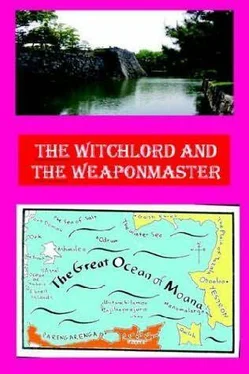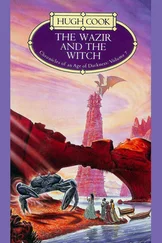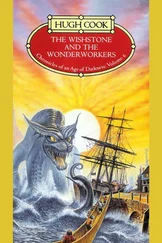Hugh Cook - The Witchlord and the Weaponmaster
Здесь есть возможность читать онлайн «Hugh Cook - The Witchlord and the Weaponmaster» весь текст электронной книги совершенно бесплатно (целиком полную версию без сокращений). В некоторых случаях можно слушать аудио, скачать через торрент в формате fb2 и присутствует краткое содержание. Жанр: Фэнтези, на английском языке. Описание произведения, (предисловие) а так же отзывы посетителей доступны на портале библиотеки ЛибКат.
- Название:The Witchlord and the Weaponmaster
- Автор:
- Жанр:
- Год:неизвестен
- ISBN:нет данных
- Рейтинг книги:5 / 5. Голосов: 1
-
Избранное:Добавить в избранное
- Отзывы:
-
Ваша оценка:
- 100
- 1
- 2
- 3
- 4
- 5
The Witchlord and the Weaponmaster: краткое содержание, описание и аннотация
Предлагаем к чтению аннотацию, описание, краткое содержание или предисловие (зависит от того, что написал сам автор книги «The Witchlord and the Weaponmaster»). Если вы не нашли необходимую информацию о книге — напишите в комментариях, мы постараемся отыскать её.
The Witchlord and the Weaponmaster — читать онлайн бесплатно полную книгу (весь текст) целиком
Ниже представлен текст книги, разбитый по страницам. Система сохранения места последней прочитанной страницы, позволяет с удобством читать онлайн бесплатно книгу «The Witchlord and the Weaponmaster», без необходимости каждый раз заново искать на чём Вы остановились. Поставьте закладку, и сможете в любой момент перейти на страницу, на которой закончили чтение.
Интервал:
Закладка:
It is widely believed in Dalar ken Halvar that many of the greatest artefacts available to our own age were sourced in the Nexus. This "Nexus" is said to have been a grouping of interlinked worlds, an association comprised of more worlds than this world has fingers to count. It is believed in Dalar ken Halvar that the stars of those worlds are not green, red, blue and yellow like the stars of our own sky, but, rather, burn with a cold and uncanny ice-chip white. Under such stars – this at least is Dalar ken Halvar's ruling superstition – metal beasts such as the dorgi were once made.
Asodo Hatch, presuming the Great God Jocasta to be a creature from just such a world, challenged Jocasta in the Code Seven which Dalar ken Halvar believes to have been spoken by the Nexus.
"You!" said Asodo Hatch, bellowing like a water buffalo as he endeavored to imitate that dreaded Nexus monster known as a dorgi. "You! You! Halt! Halt right there! Or I will eliminate you!"
"You have no idea who I am, or what," said the Great God Jocasta, responding to Asodo Hatch in the same Code Seven in which Hatch's challenge had been phrased. "Know that I am a god, and a Great God at that. Many are my servants. Their number is legion. I command heavens of ice and hells of living needles. You will bow down and worship me. Here! Now! Or you will end up in hell, where you will be constrained to burn your own liver as a sacrifice to the Lesser Slime Toad."
"I know precisely who you are, and what," said Hatch, who had no patience with such nonsense. "You are a delinquent asma from Gorbograd. If you are who I think you are, then you were employed in Gorbograd as a person in charge of cart parks."
This is what Hatch said, or at least the sense of what he said, for his words cannot be translated precisely into any of the languages of our world. For example, the "carts" of which he spoke were not precisely carts as we understand them, for they had no wheels. Rather, they hovered. But in their hovering they were not like birds or butterflies. The "carts" of which Hatch spoke were more like ghosts than vehicles made of actual wood and actual leather, for these "carts" could dissolve themselves, and could travel in a state of dissolution through stone and through steel, later coagulating themselves out of the thin smoke of their ghosthood to come to rest in the ordinary domains of the physical world. Even so, they could carry humans, or take water from place to place, just like the carts of our world.
This at least is what was believed by Asodo Hatch, and by many others in Dalar ken Halvar. And it was believed, too, that the Nexus had so many of these carts that, even though they could not jam the roads as do the carts of our own world, they caused appalling city-blighting traffic jams whenever a great number of them tried to simultaneously come to rest in the same place.
Hatch's slander was that Jocasta's function in the world of the Nexus had been to supervise the "parking" of these "carts". At least, one gathers that it was a slander, though why this should be so is not clear. After all, in our own world we think the pilot's art to be a great and worthy one. A ship's pilot who supervises the docking of ships is surely discharging a function similar to that of one who is in the cart-parking business; and the pilot has ever been saluted as one of civilization's most useful minor functionaries.
Yet on being likened to such a pilot, Jocasta declared:
"Slander! Slander!"
Then spat fire at Asodo Hatch – though weakly, for the Great God had exhausted its strength in the struggle with the orking pot.
Seeing the weakness of the flame spat by the Great God, Hatch ordered his men to seize clothing from civilians, and to use it to manhandle the still-hot orking pot. But even as those futile efforts at capture got underway, the Great God Jocasta began to escape by air, and all Hatch's efforts to hold it firm by engaging it in debate were ignored.
Jocasta fled down Scuffling Road, reached the doors of kaleidoscope which led into Cap Foz Para Lash, and uttered a highpitched command which caused those doors to dissolve away to nothing. With the way thus clear, Jocasta fled into the tunnels of the mountain, with the barriers of kaleidoscope reforming in its wake.
Asodo Hatch came to those doors. They opened for him. Hatch entered, and the doors closed behind him. Guest Gulkan did not know whether he himself still retained any right to enter that mountain, the place which had sheltered him during four long years of convalescence. Would the doors open for him? Hard on the heels of Asodo Hatch, Guest approached the first of the barriers of kaleidoscope. It dissolved away to nothing, admitting him to the interior of the mountain. The inner door then followed suit.
Once past the double doors of kaleidoscope which guarded the interior of Cap Foz Para Lash against unrestrained intrusion, Guest Gulkan swiftly caught up with Asodo Hatch, and the pair hunted down the mountain tunnels in the wake of the Great God Jocasta.
The Great God made its way to Forum Three, a lecture theater with a roof layered thickly with kaleidoscope. The Yarglat barbarian Guest Gulkan and the purple-skinned Frangoni warrior Asodo Hatch followed in hot pursuit.
"Halt!" said Guest, doing his best to imitate the wrathfulness of a dorgi or a Stogirov.
But the Great God paid him no heed.
Instead, it rose to the roof, buried itself in the kaleidoscope above their heads, and disappeared.
"Senk!" roared Asodo Hatch.
There was a pause, then Senk's features appeared on the screen which dominated Forum Three. Guest noticed that Paraban Senk, the demon who ruled the mountain of Cap Foz Para Lash, chose to paint that magical screen with a face of features olive-skinned. On their first encounter, when Guest had been a legless and armless patient of the demon's clinic, Guest had thought how very unusual those olive-skinned features will.
Now, on reacquaintance, that skin-shade reminded Guest very much of two individuals he had encountered on Untunchilamon: Ivan Pokrov (the master of an analytical engine which had been housed on a minor island in the harbor of Injiltaprajura) and Odolo (a conjurer in the service of one Justina Thrug, who had been Untunchilamon's de facto ruler at the time when Guest had been questing in that territory). Guest was inclined to think there might be some more than spurious relationship linking the olive- skinned Senk to the equally olive-skinned Pokrov and Odolo.
But a relationship of what kind?
Somehow, this hardly seemed to be the time to ask.
"Greetings, Guest Gulkan," said Senk.
While Guest had been away from Dalar ken Halvar long enough to have had trouble recognizing such a personage as Asodo Hatch,
Paraban Senk instantly recognized Guest Gulkan. Like Yubi Das Finger and other such sharp-minded personages, Senk never forgot.
Senk addressed the Weaponmaster in the Galish. On this occasion, Senk's linguistic mastery reminded the Weaponmaster uncomfortably of Schoptomov, the therapist based Downstairs in Injiltaprajura. Just like that therapist, Paraban Senk had dwelt underground for generation upon generation, gathering wisdom – and gathering evil with it? Guest's long prejudice against scholarship had been reinforced by his encounter with the therapist Schoptomov, and made him cautious in his renewed dealings with Paraban Senk.
"And to you, greetings," said Guest formally. "I am here in pursuit of my enemy, who has violated your neutrality by taking refuge here."
As he spoke, Guest was aware of an unobtrusive sound-source speaking in a language which he took to be Frangoni. Paraban Senk was giving Asodo Hatch a simultaneous translation of Guest's comments. Guest was familiar with Senk's tricks, since a similar convenience had allowed the Weaponmaster to argue with his wife
Читать дальшеИнтервал:
Закладка:
Похожие книги на «The Witchlord and the Weaponmaster»
Представляем Вашему вниманию похожие книги на «The Witchlord and the Weaponmaster» списком для выбора. Мы отобрали схожую по названию и смыслу литературу в надежде предоставить читателям больше вариантов отыскать новые, интересные, ещё непрочитанные произведения.
Обсуждение, отзывы о книге «The Witchlord and the Weaponmaster» и просто собственные мнения читателей. Оставьте ваши комментарии, напишите, что Вы думаете о произведении, его смысле или главных героях. Укажите что конкретно понравилось, а что нет, и почему Вы так считаете.












